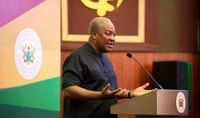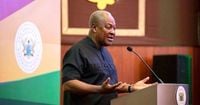On Monday, October 13, 2025, a plane carrying 14 West African nationals touched down in Accra, Ghana, marking the latest arrival under a contentious deportation accord between Ghana and the United States. This flight brought the total number of deportees accepted by Ghana since September to at least 42, according to statements from the civil society group Democracy Hub and reporting by the Associated Press and Agence France-Presse.
But just one day later, the arrangement was thrust into legal limbo. On October 14, Democracy Hub, a prominent Ghanaian civil society platform, filed a lawsuit in the Supreme Court of Ghana seeking to declare the deportation deal illegal and to challenge the treatment of deportees once they arrive on Ghanaian soil. The group’s lawyer, Oliver Barker-Vormawor, told the Associated Press that the suit alleges the agreement is unconstitutional because it was never approved by Ghana’s parliament and may violate both domestic laws and international conventions designed to protect people from persecution or torture.
The lawsuit is the latest flashpoint in a saga that has unfolded since the Trump administration began implementing a third-country deportation program across several African nations earlier this year. According to the Associated Press, the United States has struck largely secretive agreements with at least five African countries—including Ghana, Eswatini, South Sudan, Rwanda, and Uganda—to accept migrants deported from the U.S., many of whom have little or no connection to the countries receiving them. The program, critics argue, is opaque and leaves deportees vulnerable to mistreatment and legal limbo.
Democracy Hub’s court filing paints a bleak picture of what happens to deportees after their arrival in Ghana. Deportees—including some who were legal U.S. permanent residents previously protected from removal—reportedly found themselves detained in a Ghanaian military camp in what the group describes as "deplorable, inhumane and degrading conditions." According to court documents cited by Agence France-Presse, some deportees were denied access to legal counsel, held for prolonged periods without being formally charged, and ultimately transferred to neighboring countries without documents.
One particularly troubling case highlighted by Democracy Hub involves a bisexual Gambian man who, after landing in Ghana, was sent onward to his home country—despite the fact that same-sex relations are criminalized there. U.S. court filings referenced by AFP note that this transfer may have put him at significant risk of persecution, raising serious questions about Ghana’s compliance with international conventions against refoulement, or the forced return of individuals to countries where they face danger.
The legal challenge also takes aim at the process by which the deal was struck. Democracy Hub’s lawsuit claims that President John Mahama “acted unconstitutionally” by implementing the deportation agreement with the U.S. government without securing a parliamentary resolution or ratification. The group is asking the court to declare both the arrangement itself and the detention of civilian deportees in military custody as unlawful. The suit argues that, by facilitating the “onward deportation” of people in need of international protection and holding them under harsh conditions, the Ghanaian government is violating the global convention against torture.
As the legal wrangling unfolds, the fate of dozens of deportees remains uncertain. Last month, Ghanaian authorities told the Associated Press that the initial group of 14 West African immigrants deported in September had been sent on to their home countries—including Togo, Nigeria, and Mali. However, lawyers for the deportees said that 11 of them were still being held at a military camp outside Accra, and that 10 were ultimately deported to Togo, even though only two were Togolese nationals.
Human rights advocates have expressed alarm at the lack of transparency and due process in the program. According to AFP, Democracy Hub’s suit seeks a declaration that the reception and detention in Ghana of migrants who have not been charged with any offense, are held for extended periods without being brought before a court, or are denied access to legal counsel is unlawful and unconstitutional. The court is expected to hear arguments about whether to suspend the agreement on October 22, 2025.
The political backdrop to the deal is complex. Ghana’s Foreign Minister, Samuel Okudzeto Ablakwa, recently admitted on TV3 Ghana that the government agreed to accept deportees in exchange for the lifting of U.S. visa restrictions and other trade-related concessions. "They said OK, you have come to us with what you want. You want us to reverse the visa restrictions, you want (a U.S. trade deal) extended, you want us to relook at the 15% tariff. We are also now dealing with immigration challenges … So we want you to help us to deal with this issue," Ablakwa explained, according to AFP.
The Trump administration has justified the deportation program as a necessary step to crack down on migrants who entered the U.S. illegally, especially those with criminal records. The Associated Press reports that the first group of five deportees was sent to Eswatini in July 2025, all convicted of serious crimes including murder and child rape. Since then, the U.S. has also deported migrants to South Sudan and Rwanda, with six deportees currently detained in an unspecified facility in South Sudan and seven in Rwanda. Although the U.S. has an agreement with Uganda, no deportations there have been announced to date.
Rights groups, however, argue that the program is not only opaque but also deeply flawed. They contend that some migrants have been deported to third countries even when their actual home countries would have accepted them, and that the lack of oversight leaves deportees at risk of abuse and statelessness. The Associated Press and AFP both note that neither Washington nor Accra has provided an official count of deportees, further fueling concerns about transparency and accountability.
The legal battle in Ghana could set a precedent for how such international agreements are scrutinized and implemented. If the Supreme Court rules in favor of Democracy Hub, it could force the government to revisit or even suspend the deal, with ripple effects for similar agreements elsewhere in Africa. For now, though, the deportees—many of whom have already endured long journeys, uncertain legal status, and harsh conditions—remain caught in a web of international politics, legal ambiguities, and human rights concerns.
As the October 22 court date approaches, all eyes are on Ghana’s judiciary to see whether it will uphold or overturn a deal that has sparked fierce debate on both sides of the Atlantic. What’s clear is that the controversy surrounding the U.S.-Ghana deportation agreement is far from over, and the outcome will have lasting implications for the rights and futures of migrants across the region.



